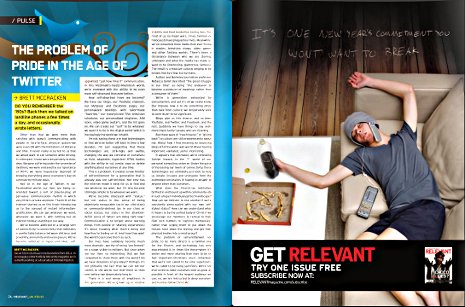My friend Jon forwarded along an article from the January/February ’09 issue of Relevant Magazine that I found to be an interesting read. You can read the full article by clicking the picture below.

A couple of quotes that I found particularly convicting:
We desperately seek to contribute – to be significant. Blogs give us this chance, and so does YouTube, and Twitter, and Facebook, and the rest. Suddenly we have things to say and — more importantly — people who are listening.
But these ways of “reaching out” or “giving back” to culture are still predominantly about me. About how I find meaning by bouncing ideas off of the wider web world. About feeling important, validated, useful, interesting.
I’ve never really thought about it this way, but the “Social Networking Revolution” is, fundamentally, something about “me.” In broadcasting what is going on in my life (and seeing what is going on in the lives of others), Twitter/blogging/whatever speaks to my pride, my desire to “feel important” or be respected.
Even when it comes to finding new music, a voice in the back of my head considers the satisfaction and the affirmation I receive I find something my friends haven’t heard of before. I used to check the stats on my webpage often to see how many people visited daily, and from where. Seeing lots of hits made me feel important, as though people somewhere looked to me for insight or information. It was a good feeling.
Looking to the outside world to affirm that can be very, very dangerous. In attempting to feel connected with others, we increasingly abstract ourselves from real relationships, selfishly focusing on ourselves above all else. We end up creating our own truths and realities.
It appears that ultimately we’re retreating further inward, to the “i” world of our personal computing universe. Under the guise of increasing our levels of connectivity, these technologies are ultimately just tools to help us isolate, insulate and unshackel from the outmoded constraints of having to answer to anyone other that ourselves.
“Social web” applications such as Facebook or Twitter by nature open up a multitude of possibilities and capabilities for digital interaction, and I’ve incorporated a number of them into my daily routine. It is important to balance these digital interactions out with “real” relationships, however. There is no substitute for grabbing breakfast or coffee with a friend, looking them in the eyes, and really communicating without feeling the need to show off.
Accountability is refreshing; it’s funny how we can find ourselves silently sitting in front of a screen for hours on end, wondering why we still feel empty.
The end of the article frames the issue well from a Christian perspective:
In times like these – when it’s easier and more alluring than ever to be or feel important – Christians must remember that we’re not called to be viral superstars, we’re called to be living sacrifices. We’re not instructed to make ourselves look as good as possible in front of the largest audience we can; no we are instructed to deny ourselves and humbly follow Christ.
It’s our best friends that remind us of that, anyway.
Edit: my friend Harrison has some good commentary on this article over on his website, as well. I recommend you go over and read what he has to say.

